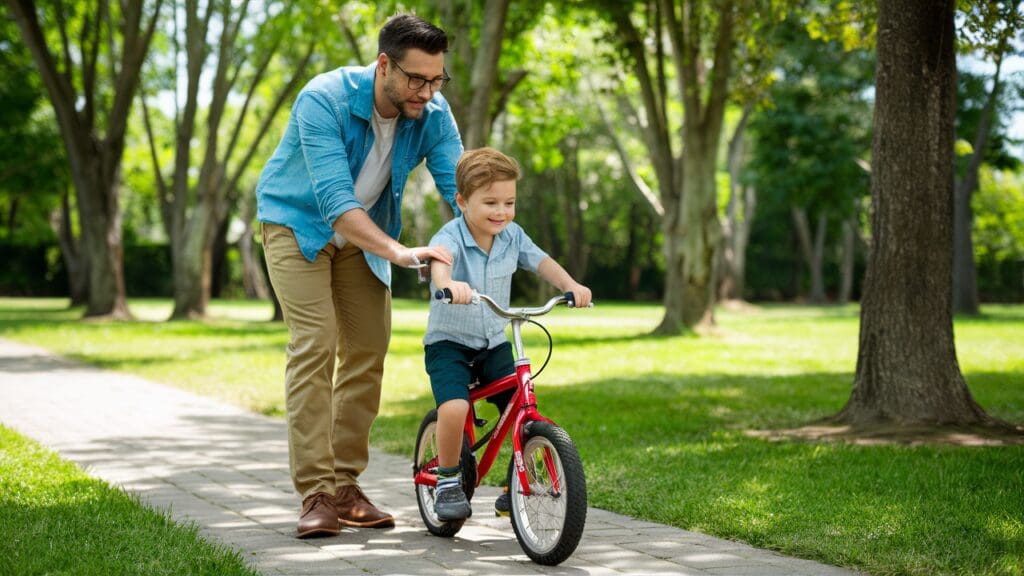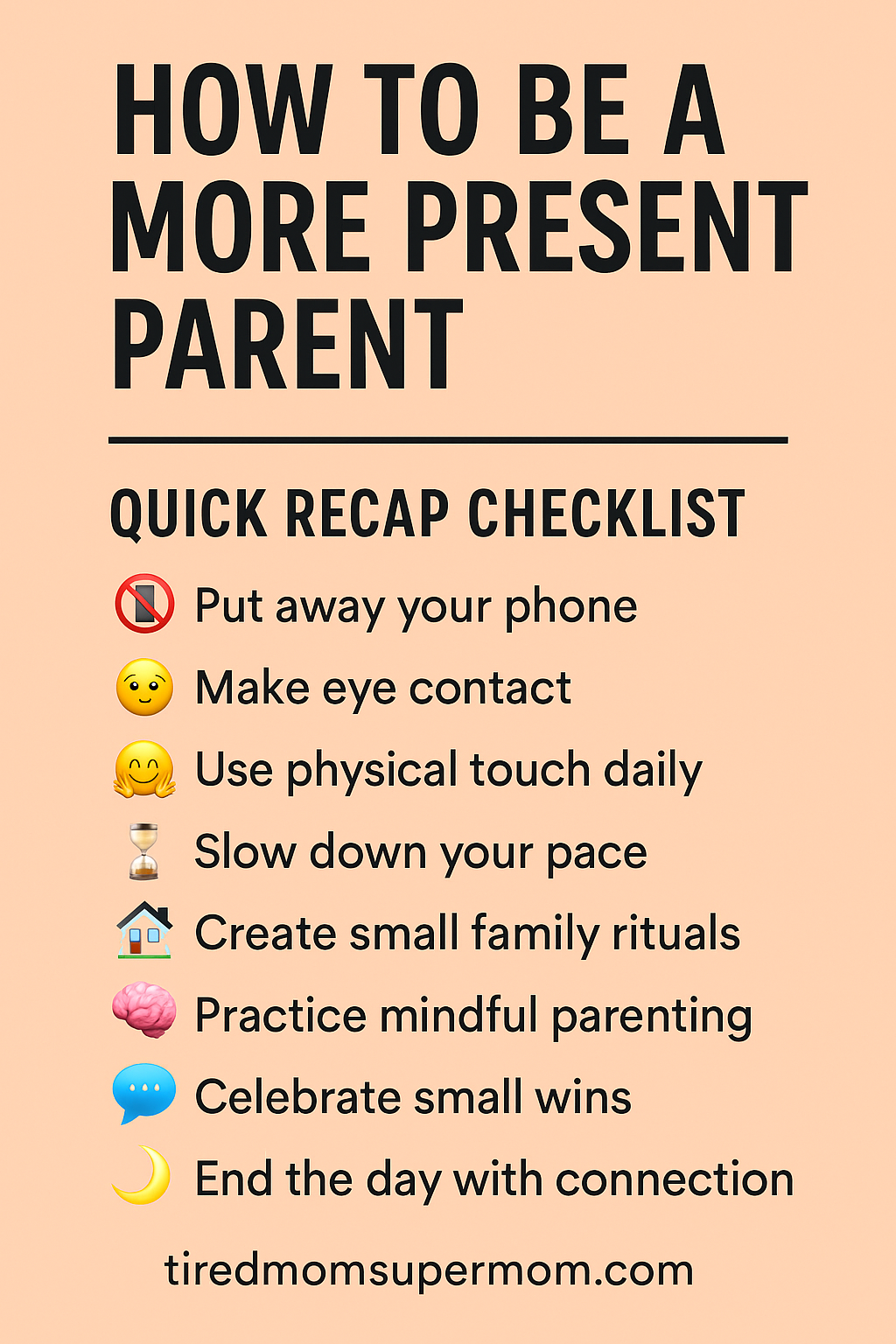How to Be a More Present Parent: 13 Powerful Ways to Build Deeper Bonds
Parenting today feels like a constant race — between school drop-offs, work meetings, meal prepping, and endless to-do lists. It’s no wonder many of us wonder how to be a more present parent when the day already feels too short.
But here’s the good news: present parenting isn’t about being perfect — it’s about being intentional. It’s the tiny, meaningful moments strung together that create strong, resilient, connected kids.
In this guide, you’ll learn how to be a more present parent with simple, practical strategies you can start today — even in a busy, imperfect life.
Heads up: This post may include affiliate links. As an Amazon Associate, I earn from qualifying purchases—at no extra cost to you. Full privacy policy and disclosure here.

Why Being a Present Parent Matters
When you learn how to be a more present parent, you’re giving your child emotional security, building trust, and boosting their self-esteem. According to Harvard’s Center on the Developing Child, consistent, responsive interactions strengthen a child’s brain development and emotional resilience.
Children who experience truly present parenting tend to:
- Develop stronger emotional regulation
- Build better social skills
- Show more resilience in tough situations
- Feel loved, valued, and understood
Simply put: your presence is one of the most powerful parenting tools you have.
13 Practical Tips for How to Be a More Present Parent
1. Put Away Distractions
Start by silencing notifications and placing your phone out of sight when you’re spending time together. Try a simple kitchen timer to create dedicated tech-free blocks each day.
Presence starts when distractions stop.
2. Create Micro-Moments of Connection
If you’re wondering how to be a more present parent without overhauling your schedule, focus on micro-moments — tiny bursts of full attention, like:
- A hug before school
- Asking about their favorite part of the day
- Singing in the car together
3. Make Eye Contact and Smile
Non-verbal signals are huge for kids. Stop, look them in the eye, and smile when they speak. This small habit says: “I’m here. I’m listening.”
Using a family conversation starter deck can also help spark deeper chats.
4. Establish Meaningful Rituals
Consistency builds trust. Create a morning snuggle ritual, a bedtime story routine, or even Saturday pancakes.
Want more ideas for strong family traditions? Check out 25 Must-Read Parenting Blogs — they’re packed with real-life inspiration.
5. Practice Active Listening
Don’t just hear — listen. Nod, paraphrase what your child says, and show genuine interest.
Tip: Sitting on the floor at their eye level helps build instant connection.
6. Say “Yes” More Often
Say yes to:
- Building a fort
- A quick tea party
- A silly dance-off
A cozy reading tent can even turn into your special “yes” zone for bonding.
7. Slow Down Your Pace
Children move slower by nature. Instead of rushing them, match their rhythm sometimes. You’ll see details you usually miss — and so will they.
8. Turn Everyday Chores into Togetherness Moments
Folding laundry? Setting the table? These are perfect opportunities for conversation.
Avoid these 6 common mistakes parents make when introducing chores to keep it fun and collaborative!
9. Practice Mindful Parenting
According to the Child Mind Institute, mindful parenting helps regulate both your emotions and your child’s.
Simple steps:
- Take 3 deep breaths before responding
- Notice your emotions without judgment
- Focus fully on the present interaction
You might even consider starting a parent-child mindfulness journal to grow together.
10. Celebrate Small Wins
Caught them being kind? Praise it.
Finished a tricky puzzle? Celebrate it.
A gratitude journal can help both you and your child stay focused on positives.
11. Embrace Imperfect Moments
Real life is messy. Dinner gets spilled. Feelings get hurt. You lose your cool.
Presence is about returning, not perfection. Repair the relationship with hugs, apologies, and laughter.
For extra encouragement, browse through 200 Inspirational Parenting Quotes.
12. Use Physical Touch Daily
Hugs, kisses, back rubs, piggyback rides — physical touch reassures children they are safe, loved, and connected.
Even older kids need regular, casual touch — a hand on the shoulder, a high-five, a playful nudge.
13. End Each Day with Connection
Before bed, spend five undistracted minutes:
- Snuggling
- Sharing favorite parts of the day
- Planning a small joy for tomorrow
Simple traditions build a lifetime of memories.

Frequently Asked Questions About Present Parenting
What does it really mean to be a present parent?
It means offering your full attention — emotionally, mentally, and physically — in a way that makes your child feel truly seen and heard.
Can I be a present parent if I work full-time?
Absolutely! Quality matters far more than quantity. Even 10 minutes of full, undivided attention each day can create lasting emotional security.
How can I be more present during chaotic days?
Focus on little anchors — morning hugs, dinner chats, bedtime stories. You don’t need hours; you need intention.
What if I struggle with impatience or distractions?
You’re human. Start with small goals, like 5 minutes of pure presence. Tools like a visual daily checklist (coming soon!) can help you stay consistent.
Does present parenting really improve behavior?
Yes! Children who feel connected are often more cooperative and better able to self-regulate.
Need help calming emotional outbursts? See how to get your toddler to listen without yelling for smart tips.
Final Thoughts: You’re Doing Better Than You Think
Learning how to be a more present parent isn’t about never messing up — it’s about showing up again and again, with love and openness.
When your child knows you are there for them, even imperfectly, you’re giving them an incredible foundation of trust, self-worth, and resilience.
You’ve got this. ❤️
Quick Recap Checklist: How to Be a More Present Parent
- 📵 Put away your phone
- 👀 Make eye contact
- 🤗 Use physical touch daily
- ⏳ Slow down your pace
- 🏡 Create small family rituals
- 🧠 Practice mindful parenting
- 💬 Celebrate small wins
- 🌙 End the day with connection
Presence Is the Greatest Gift You Can Give
At the end of the day, learning how to be a more present parent isn’t about doing more — it’s about being more in the moments that matter.
It’s the everyday hugs, the uninterrupted conversations, the willingness to listen without rushing that build a child’s inner world.
Even if life feels chaotic, choosing connection over perfection will leave a lasting imprint far beyond childhood.
Start small, stay consistent, and know that every moment you choose presence is shaping a stronger, happier, and more resilient family. You’re already on the right path — and your child feels it more than you know.
✨ Save this checklist for quick daily reminders on how to be a more present parent! Pin it now and start building deeper connections with your kids today! ❤️

